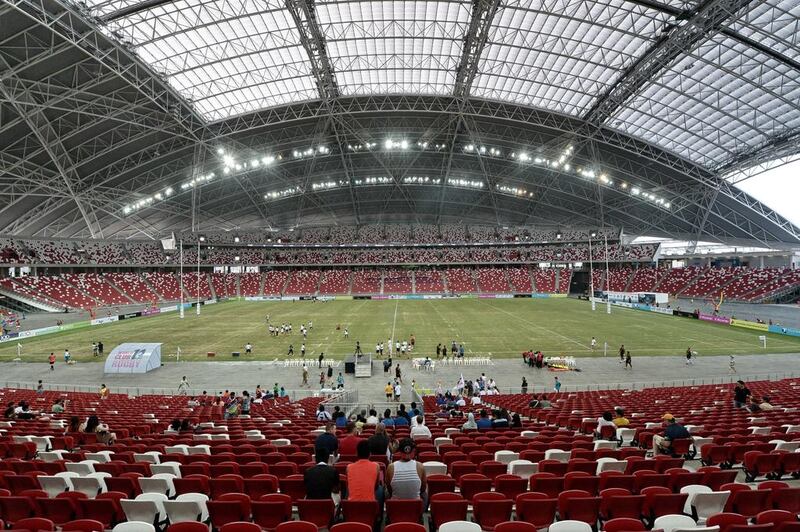SINGAPORE // Singapore's plan to boost its international profile by staging a glamour football friendly between Brazil and Japan could backfire due to the appalling state of the playing surface at the centrepiece of the city-state's US$1 billion (Dh3.67bn) Sports Hub.
A sell-out crowd is expected at the 55,000-seat retractable roof National Stadium to watch the five-times world champions play the Asian Cup winners on Tuesday.
Locals are eager to catch a glimpse of the likes of Neymar, Kaka, Keisuke Honda and Shinji Kagawa, but whether the quartet will be risked on the patchy surface is another matter.
The field seemed to have as much sand on it as grass and was cut up in several areas when it was viewed by media earlier in the week.
The Football Association of Singapore (FAS) acknowledged the poor surface but declared it fit for use late on Thursday.
“We are of the view that the pitch is playable and the game can proceed if the match commissioner and teams agree,” the FAS said in a statement.
“However, we are also of the opinion that the condition of the field is far short of expected international playing standards, which could affect the standard of play.”
Italian champions Juventus played the first football match at the new stadium in August when they beat a Singapore selection 5-0, but the Turin club did not hold back in their criticism of the surface.
Juventus manager Massimiliano Allegri said after the match he had not selected first-choice players Carlos Tevez or Arturo Vidal “to avoid pointless risks because the pitch was bad.”
The hybrid pitch, made from natural grass and reinforced by millions of artificial turf fibres, had improved after the Juventus fixture, with promoters confident all would be well for Tuesday’s game.
However, the surface seems to have suffered due to the number of public events it has been expected to stage.
Last month, a protective covering was put over the pitch to minimise the effects of 20,000 runners trampling the grass in various races at the National Stadium.
And scars are still visible at both ends of the field where rugby goalposts were placed for the stadium’s first event, an international 10s tournament in June.
The stadium also hosted a school rugby tournament in August, with coaches complaining about sand kicking up in the eyes of the players and amid fears of a slippery surface causing injury.
The FAS will host some matches for the Suzuki Cup, Southeast Asia’s football championship, in November and December, but the regional body has also voiced their fears about the pitch.
“We share the ASEAN Football Federation’s [AFF] concerns about the readiness of the venue for the upcoming AFF Suzuki Cup,” the FAS said.
“The FAS is supportive of the Sports Hub’s continuing efforts to ensure a good playing surface.
“To assist in this endeavour, the FAS has opted not to schedule any home international ‘A’ friendlies at the National Stadium and is prepared to forego all of the Lions’ training sessions at the National Stadium in the lead-up to the Suzuki Cup, even though this will have an impact on home-ground advantage.”
Singapore, ranked 149th in the world by Fifa, have yet to play a match on their new home pitch.
Meanwhile, Brazil coach Dunga warned Beijing’s choking smog was likely to affect their friendly with Argentina on Saturday by forcing him to make mass substitutions.
With an "orange" pollution alert in the Chinese capital, and several complaints from his team, Dunga said that he would limit players' time on the pitch to reduce their exposure.
“The pollution in Beijing is bad for both Brazil and Argentina so both teams have to do their best and deal with it, as we cannot change it ourselves,” he said.
“Our plan is to make plenty of substitutions so that the players will not be affected by it.”
Visibility has dropped dramatically, shrouding buildings in haze, as pollution soars to 20 times the maximum daily exposure recommended by the World Health Organisation.
Argentina coach Gerardo Martino insisted the pollution was "not a factor", and he dismissed an incident where Messi was seen bent over and coughing on a smoggy training pitch this week.
“There was a small situation with Messi, but he is totally fine,” Martino said.
Brazilian players, who went through an hour-long, slow-paced training session at Beijing’s Bird’s Nest stadium yesterday, appeared taken aback by the pollution.
“It’s difficult to breathe. My throat is dry, it’s like we’re standing next to a bonfire, like hot smoke,” striker Robinho said.
Philippe Coutinho said it was sometimes hard to work out whether it was night or day.
“The air is a bit strange. Sometimes you think it’s the middle of the night. It’s very dusty,” he said.
David Luiz expressed sympathy for the Chinese people, for whom unhealthy air is all too common.
“Short-term you don’t notice it much, but we hope that this [pollution] can change, because the Chinese people don’t deserve to live like this,” he said.
sports@thenational.ae
Follow us on Twitter at @SprtNationalUAE





